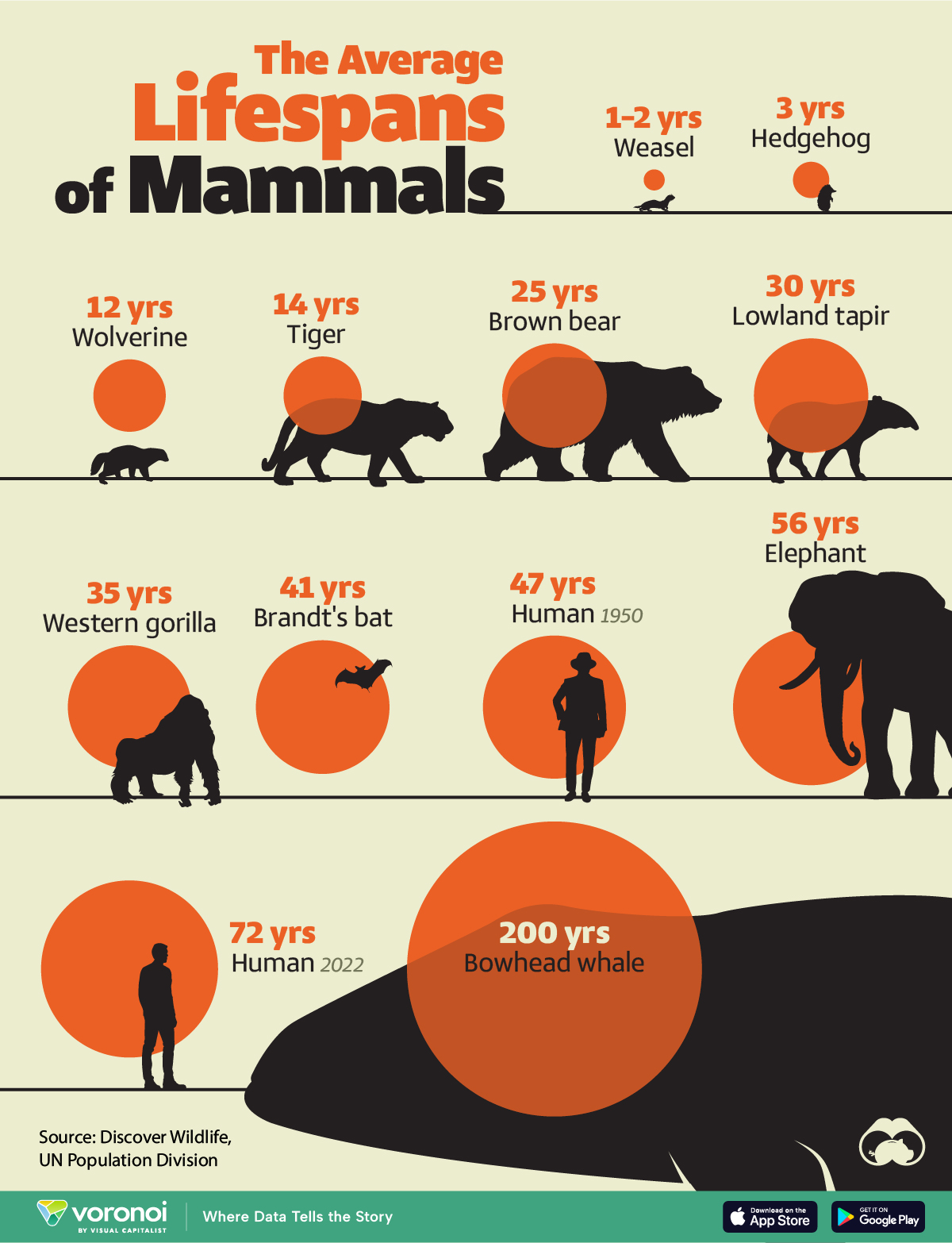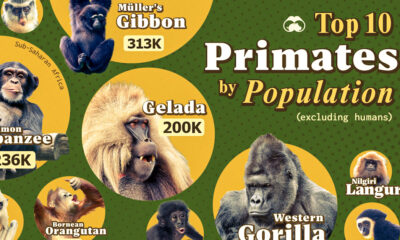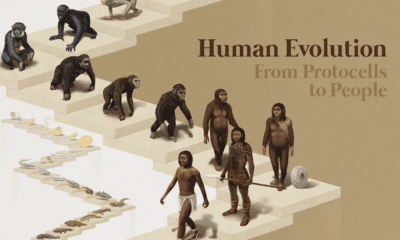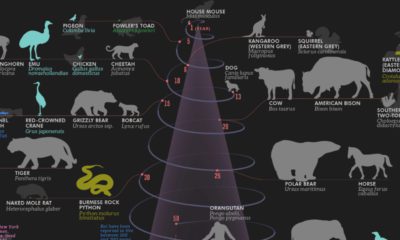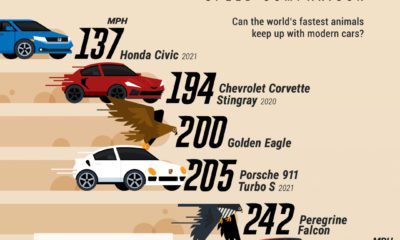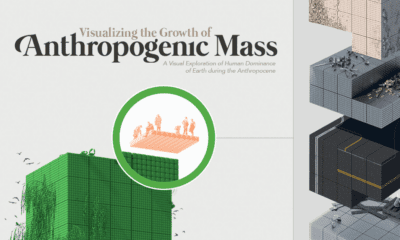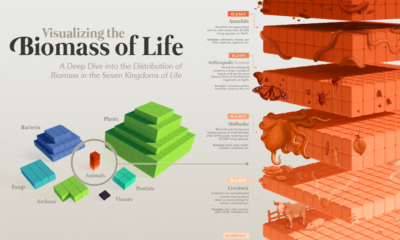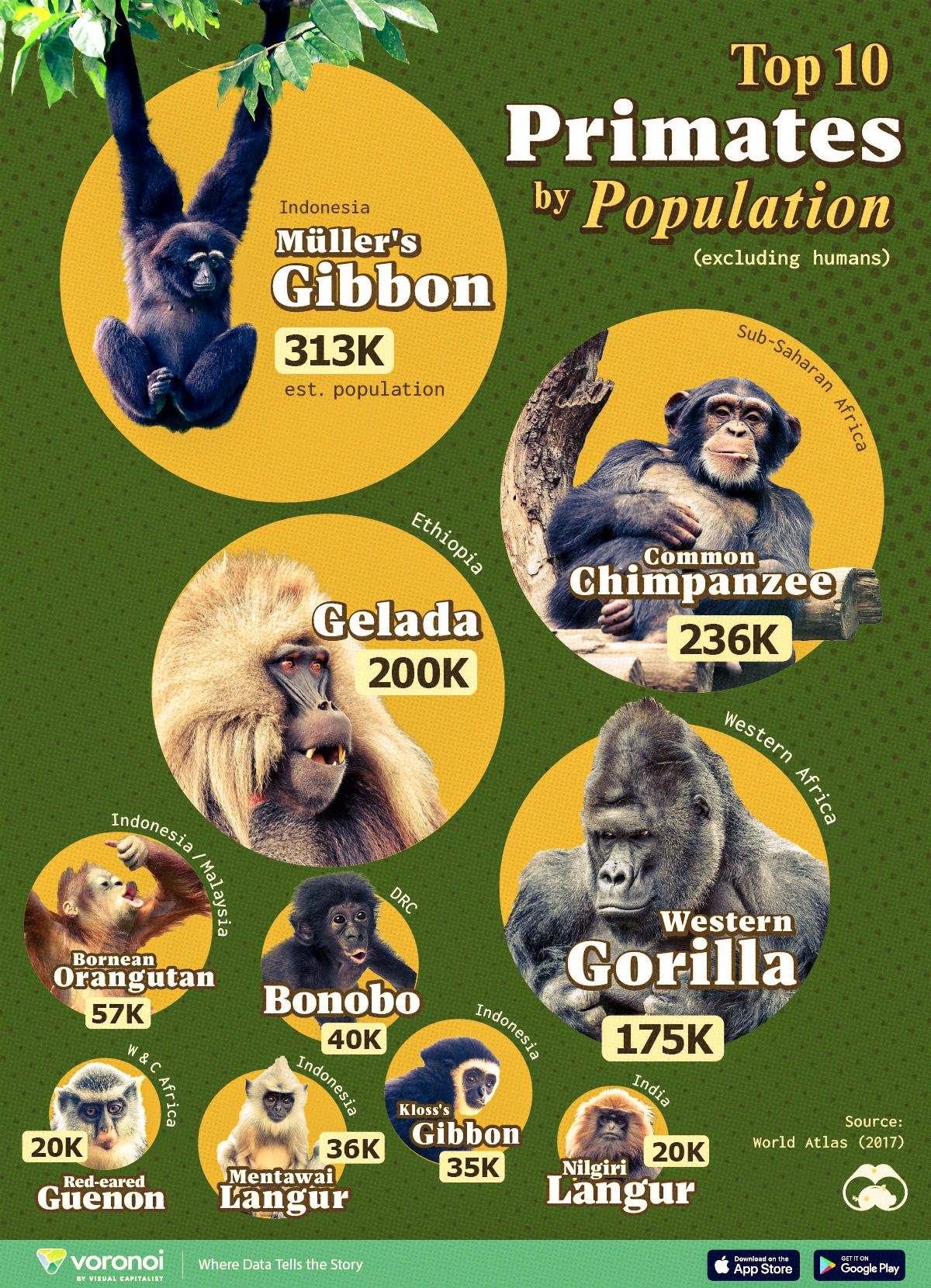Science
Visualizing the Average Lifespans of Mammals
![]() See this visualization first on the Voronoi app.
See this visualization first on the Voronoi app.
Visualizing the Average Lifespans of Mammals
This was originally posted on our Voronoi app. Download the app for free on iOS or Android and discover incredible data-driven charts from a variety of trusted sources.
Mammals, though comprising a small fraction of Earth’s creatures, hold vital ecological roles globally. They are crucial for maintaining ecosystem health through services like pollination, seed dispersal, and predator-prey dynamics.
In this visualization, we depict the average lifespans of mammals, using data from Discover Wildlife and the United Nations.
Human Lifespans on the Rise
Defined as warm-blooded creatures with hair or fur, mammals nurse their young with milk from mammary glands. While smaller animals such as weasels typically live 1-2 years, larger counterparts like elephants can thrive for decades, and bowhead whales can live for 200 years, or even longer.
| Animal | Average lifespan (years) |
|---|---|
| Weasel | 1 to 2 |
| Hedgehog | 3 |
| Wolverine | 12 |
| Tiger | 14 |
| Brown bear | 25 |
| Lowland tapir | 30 |
| Western gorilla | 35 |
| Brandt's bat | 41 |
| Humans (1950) | 47 |
| Elephant | 56 |
| Humans (2022) | 72 |
| Bowhead whale | 200 |
Notably, human lifespans have experienced a remarkable surge. According to the UN Population Division, the global average life expectancy has surged from 47 years in 1950 to 72 years in 2022, marking a 25-year increase. This is attributed to advancements in nutrition, medication, and essential resources.
However, as human longevity flourishes, it can have an adverse effect on wildlife mammal populations. To put this into numbers, over the past 100,000 years, the surge in human population has precipitated an 85% reduction in wild mammal biomass.
Today, livestock dominates 62% of the world’s mammal biomass, with humans accounting for 34%, while wild mammals comprise only 4%.
Despite a decline in mammal diversity, the total biomass of terrestrial mammals has significantly increased, expanding approximately ninefold over the past 10,000 years.
Curious to learn more about mammals? Check out this graphic that shows the biomass of all the world’s mammals.
Science
What Are the 10 Most Common Primates in the World?
This list excludes humans, who would otherwise lead the ranks of most common primates by a significant margin.
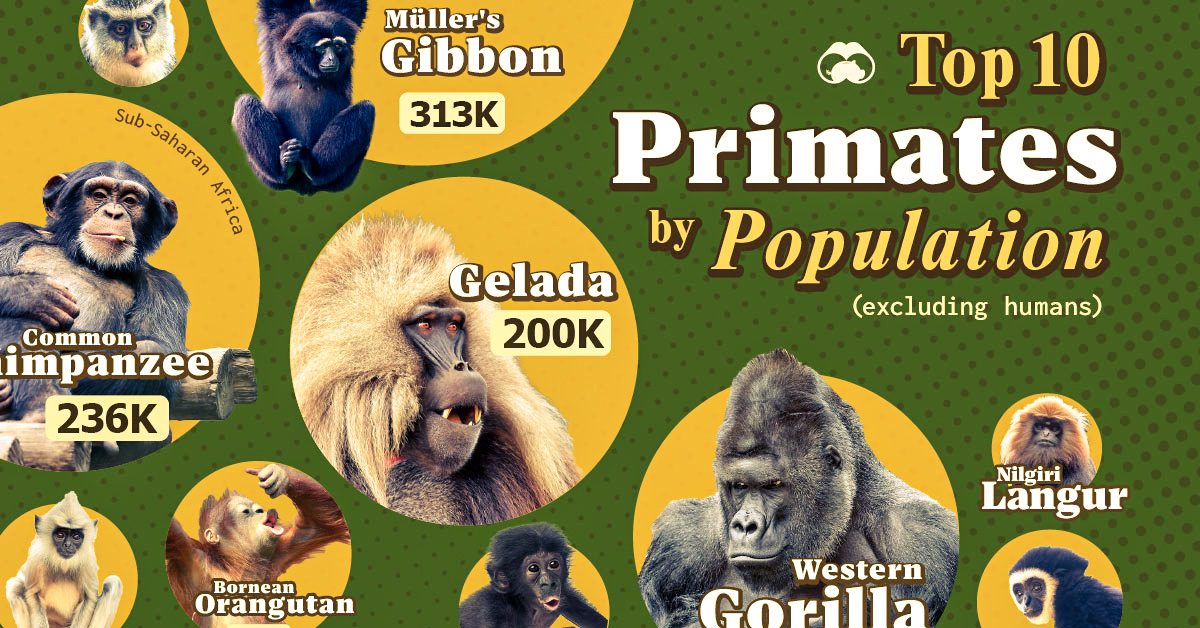
What Are the 10 Most Common Primates in the World?
This was originally posted on our Voronoi app. Download the app for free on Apple or Android and discover incredible data-driven charts from a variety of trusted sources.
The word ‘primate’ traces its roots back to the Latin word ‘primas,’ meaning ‘of first rank’ or the highest order in the animal kingdom. This classification intuitively reflects humans’ fascination with the many species who are our closest cousins.
In this graphic, we visualize the top 10 species of primates, ranked by their estimated global population. This data comes from WorldAtlas, and was last updated in 2017.
Given the difficult nature of tracking wild animals, these numbers should be treated as approximations rather than exact figures.
Ranked: Top 10 Primates, by Population
At the top of the list, there are more than 300,000 Müller’s Bornean Gibbons in the world, found on the island of Borneo in Indonesia and Malaysia.
The larger gibbon family consists of around 20 species of small apes found swinging through Southeast Asian rainforests. These acrobatic primates are known for their loud calls, impressive agility, and monogamous family structures.
Despite their ape status, they differ from great apes by being smaller and lacking nests.
| Rank | Monkey | Region of Origin | Estimated Population (as of 2017) |
|---|---|---|---|
| 1 | Muller's Bornean Gibbon | 🇮🇩 Indonesia | 312,500 |
| 2 | Common Chimpanzee | 🌍 Sub-Saharan Africa | 236,200 |
| 3 | Gelada | 🇪🇹 Ethiopia | 200,000 |
| 4 | Western Gorilla | 🌍 Western Africa | 175,000 |
| 5 | Bornean Orangutan | 🇮🇩 Indonesia / 🇲🇾 Malaysia | 57,000 |
| 6 | Mentawai Langur | 🇮🇩 Indonesia | 36,000 |
| 7 | Bonobo | 🇨🇩 DRC | 39,750 |
| 8 | Kloss's Gibbon | 🇮🇩 Indonesia | 35,000 |
| 9 | Red-eared Guenon | 🌍 West & Central Africa | 20,000 |
| 10 | Nilgiri Langur | 🇮🇳 India | 20,000 |
Ranked second, the Common Chimpanzee can be found in the savannas and forests of sub-Saharan Africa. A subspecies—the Eastern Chimpanzees in Tanzania’s Gombe National Park—were the primary focus of noted biologist Jane Goodall’s pioneering research in the 1960s.
Despite their apparent numbers, chimpanzees are now classified as an endangered species by the UN, their survival threatened by habitat loss, poaching, and disease.
All the way across, in Ethiopia, the Gelada species is the third most populous primate on the planet. Their short, stump fingers make them adept rock climbers—useful for navigating the Semien mountains they call home.
At fourth place, the Western Gorilla, also found in Africa, is the last primate species with a population above 100,000. The Western Gorillas are a little smaller than their Eastern counterparts, who are the largest living primates.
See More Animal Graphics From Visual Capitalist
If you’re curious to learn more about animals, check out this graphic that ranks the top speeds of the world’s fastest animals.
-

 United States6 days ago
United States6 days agoVisualizing the Most Common Pets in the U.S.
-
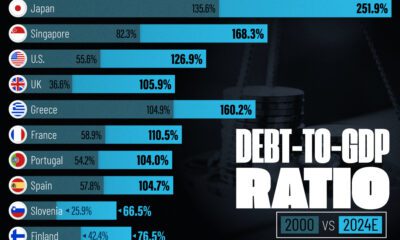
 Debt2 weeks ago
Debt2 weeks agoHow Debt-to-GDP Ratios Have Changed Since 2000
-

 Culture2 weeks ago
Culture2 weeks agoThe Highest Earning Athletes in Seven Professional Sports
-

 Brands2 weeks ago
Brands2 weeks agoHow Tech Logos Have Evolved Over Time
-

 Energy2 weeks ago
Energy2 weeks agoRanked: The Top 10 EV Battery Manufacturers in 2023
-

 Demographics2 weeks ago
Demographics2 weeks agoCountries With the Largest Happiness Gains Since 2010
-

 Economy2 weeks ago
Economy2 weeks agoVC+: Get Our Key Takeaways From the IMF’s World Economic Outlook
-
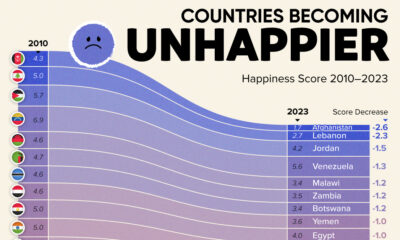
 Demographics1 week ago
Demographics1 week agoThe Countries That Have Become Sadder Since 2010

